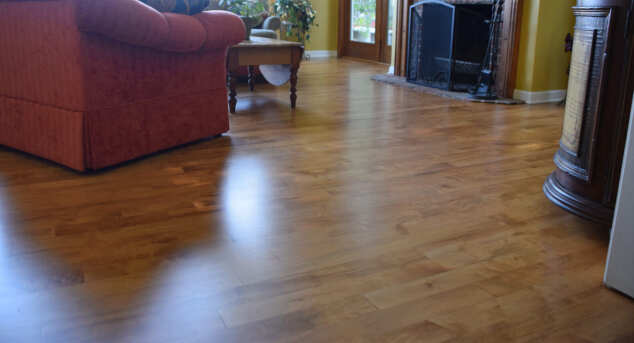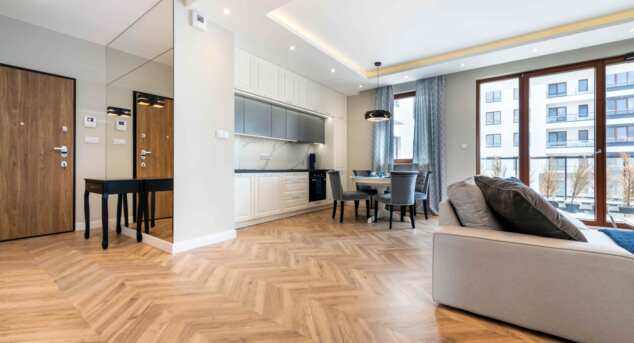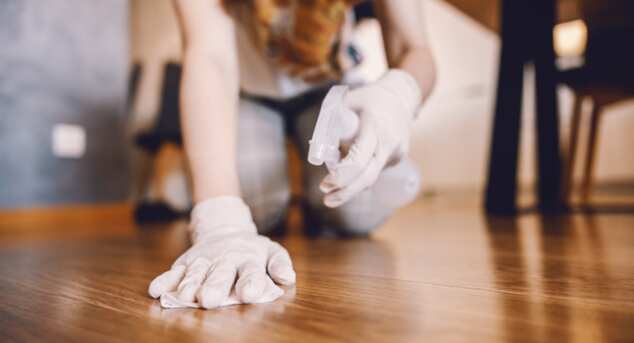Luxury Vinyl Plank (LVP) Flooring vs. Hardwood
Posted by Aaron Schaalma
Table of contents

This is an updated version of the original post which was published on March 30, 2019.
Luxury vinyl plank flooring (LVP) is a type of flooring that has gained some popularity in recent years. It is made to look like wood but is more durable and easier to care for. However, the explosion in popularity isn’t across the board and some companies are not selling it.
But why?
Vinyl flooring has been around in places like offices, restaurants and commercial spaces for a while. And now we are seeing a big shift of luxury vinyl trending in homes. The champions of luxury vinyl planks say it’s a good alternative to hardwood flooring. But what they aren’t telling you is that luxury vinyl flooring is not as sustainable or as economical as people think. And even worse, according to a study at Duke University, it can be hazardous to your health. Yep, you read that right (but more on that later).
If you are thinking about adding luxury vinyl plank flooring to your home, be sure to do your research. This article I provide the pros and cons of LVP compared to natural hardwood.
Contents:
- What is LVP?
- What Do Both LVP and EVP Have in Common?
- What are Hardwood Floors?
- Why are luxury vinyl floors trending?
- Which Is Better - Hardwood or LVP?
- What Are Disadvantages of LVP?
- Hardwood as Alternative
- Is VLP More Expensive Than Hardwood?
- Does LVP Increase Home Value?
So What Exactly Is Luxury Vinyl Flooring and How Does It Work?
While there are variations of luxury vinyl flooring, depending on the type and brand, the above picture shows you the main layers that go into some luxury vinyl plank flooring. In short, It’s flooring that’s made up of multiple layers of different materials that can help aid in its design which can look and even feel like hardwood.
There are two types of luxury vinyl plank flooring: Engineered vinyl planks (EVP) & luxury vinyl planks (LVP).
Luxury vinyl planks (LVP)
LVPs are individual pieces of vinyl that come in different grades, offering varying levels of design options.
Engineered vinyl planks (EVP)
EVPs are engineered in layers and are a segment of luxury vinyl flooring. From top to bottom the layers go from vinyl, high-density core board and is usually attached to a cork bottom.
What Do Both LVP and EVP Have in Common?
Great question!
While they offer a realistic look and sometimes feel of real hardwood, they ALL contain a variant of plastic, which is not safe for your home or the environment. But what exactly constitutes “real” hardwood?
According to the National Wood Flooring Association (NWFA), real wood is a:
“hard fibrous material that forms from the main substance of the trunk or branches and beneath the bark of a tree. [And] a wood floor is any flooring product that contains real wood as the top-most, wearable surface of the floor.”
What About Hardwood Floors?
There are two main types of hardwood floors: Solid wood flooring & engineered wood flooring.
Solid wood flooring is a solid piece of wood from top to bottom.
Engineered wood flooring is normally multiple wood veneers or slats of wood glued together, but you can rest assured they are real wood from top to bottom.
Why Are Luxury Vinyl Floors Trending?
Vinyl plank flooring can be resilient to heavy foot traffic and can achieve a similar look and feel to other styles of flooring like hardwood.
Plus the proponents of vinyl say it’s easy to install and can be resilient against dings and dents.
Which Is Better - Hardwood or LVP?
Classic, never-goes-out-style hardwood offers the same benefits benefits of easy installation and resilience.
And while vinyl is promoted as being resilient, repairs can be a nightmare if you should need them depending on the installation method. Once vinyl flooring is laid, it’s hard to repair and will usually have to be replaced.
Whereas with hardwood, there is always the option to refinish and restain. Here are some endless color possibilities of hardwood for some inspiration!
The Superior Lifespan of Hardwood
Plus luxury vinyl floors don’t come close to offering the lifespan of what hardwood offers. We are talking about a lifetime with hardwood compared to the 10-20 years that you might get with vinyl flooring.
So why install luxury vinyl when hardwood could last up to 100 years, is cost effective and eco-friendly?
And those are just a few reasons why hardwood is a better choice, but check out more reasons why hardwood is the way to go here.
What Are Disadvantages of LVP?
Now let’s dive a little deeper and get into the not so eco-friendly and costly truth behind what goes into the production, ingredients, installation, and disposal of vinyl flooring.
LVP Production

First up, the production of vinyl flooring.
Dioxins, which are carcinogen bioaccumulative toxins, are created and emitted into the air, affecting the environment during the production process of vinyl flooring.
Furthermore, these toxins not only linger in the air but also travel, infiltrating our air, and affecting our health and the health of animals for hundreds of surrounding miles.
So not only the animals are being affected by this carcinogen, but also the plant life. So in short, your food is also being affected! Just some brain food for you to chew on.
LVP Ingredients
The second thing to consider is the Ingredients of vinyl flooring.
Petroleum
One of the main ingredients in luxury vinyl plank flooring is petroleum! Petroleum is a nonrenewable resource that should be avoided if you are concerned with the impact on the environment.
PVC
Moreover, these floors also consist largely of polyvinyl chloride known as (PVC). And unfortunately, this is one of the most environmentally detrimental materials produced and has been classified as a human carcinogen. Plus there isn’t a completely safe way to manufacture or dispose of PVC.
Phthalates
Vinyl can also contain many different types of phthalates which can leach into our water and food supply and many of them are considered cancer-causing materials. We have also seen studies that suggest that luxury vinyl flooring may also contain ethylene dichloride, mercury, and other chemicals that are unsafeand have been banned from children’s products and other consumer goods.
LVP Installation
The third is luxury vinyl floor installation. Are there still health and environmental concerns after installation?
You bet ya!
VOC
Due to the chemicals used in the production of these floors. They will often continue to admit Volatile Organic Chemicals (VOC) in the air even after they are installed in your home. Making them not only environmentally harmful but also unsafe for you and your family.
Adhesives
Besides chemicals used in the productions of these floors that continue to be an issue post-installation, some adhesives used to install these floors are also a cause for concern. Vinyl floors can be installed with an adhesive containing asbestos. Asbestos can also lead to the release of Volatile Organic Chemicals into the air of your home long after installation.
And while some luxury vinyl plank floor manufacturers are trying to reduce the amount of harmful chemicals in vinyl, many have not been able to because chemical manufacturers are not required to reveal proprietary ingredients in their products making it almost impossible to determine which products still include hazardous chemicals.
Worth it? Probably not! After all, can you really put a price on you, your family and the environment's safety and health?
Is LVP Biodegradable or Recyclable?
And lastly, can vinyl plank flooring be recycled or is it biodegradable? So let’s say you’ve had these luxury vinyl plank floors for a couple of years. And now, seeing that they aren’t exactly what you thought, you are considering new flooring.
And now they must be disposed of. . .
What happens to them? Can they be recycled?

Unfortunately, it’s almost impossible to recycle vinyl flooring. Furthermore, these floors are not biodegradable and will end up just sitting in a waste factory oftentimes for many more years than they were actually used as flooring.
So don’t be fooled!
This picture may look like hardwood flooring but it’s not. This is luxury vinyl flooring.
And this so-called “luxury” comes at a huge cost to you and an even greater to the environment!
So think twice before you vinyl.
Hardwood as the Alternative

How do you find out if your flooring is safe and sustainable?
The Environmental Working Group has a great flooring guide to help get you on the right track. Your personal health and what is best for the environment are of utmost importance.
So now that we know hardwood is a safer, more sustainable and more economical option, what are some good hardwood alternatives to luxury vinyl plank flooring?
Sustainable Hardwood
Timber is one of the most energy efficient materials available due to it being the product of solar energy, making hardwood one of the most sustainable options for flooring. But if you are looking to go that extra mile for that good-for-the-environment option. You have a few options.
The first is reclaimed hardwood flooring. What is reclaimed hardwood flooring, you ask? Well, it’s just lumber that has been previously used for other things such as old wood that was once a barn. It basically upcycling old lumber into hardwood flooring.
And if something like reclaimed wood doesn’t tickle your fancy, then you can always go for something rustic like hickory. Hickory is a good sustainable option because it’s local to Wisconsin, and it’s also a hard and dense wood that holds up well over time. It’s homey feel and unique grain patterns make it a favorite flooring option.
Safe Hardwood
When it comes to the environment, hardwood is one of the best options out there.
But what about for you and your family? Are some types of hardwood more “safe” than others?
Most hardwood is going to be safe from a chemical and toxin standpoint, unlike vinyl planks. But what’s important to note is that you need to pick low-VOC options.
Using coating on your floors such as natural oils and hard waxes are not only safe, but they also offer a variety of benefits, giving you the ultimate safe-flooring without sacrificing style, durability or finishing options.
Pretty cool, huh?
Some of these options include:
Hard Wax
Hard wax offers a transparent, durable, silky gloss finish. It also seals the pores of the wood helping your floors repel water and dirt.
Pure Oil
Pure oil such as tung and linseed oil penetrates deep into the wood and hardens. This gives you well-sealed, water-resistant floors with a low-sheen matte finish that brings out the grain and texture of your hardwood.
And if you still need some info on “safe” flooring, the Environmental Working Group has some great pointers:
- Choose hardwood flooring
- Make sure your hardwood is Forest Stewardship Council (FSC)-certified
- Choose low-VOC wood stains, sealants and finishings
- Avoid using any glue or adhesives that are not environmentally friendly
- Look for GreenGuard certified products
All these tips will help keep your home and family happy and healthy.
Is LVP More Expensive Than Hardwood?
LVP is more affordable than hardwood - because hardwood after all is the real thing. However, most hardwood is going to last for years and would be considered economical compared to something like vinyl floors that have a much shorter lifespan.
However, there are a few things to consider if you are looking to save some money on hardwood.
First, usually domestic and local hardwood is going to be cheaper. The trick is to find something that is local and will hold up, meaning it will probably be a harder wood. You can find more information about the hardness of each type of wood by checking out the Janka hardness scale.
But really, your best option is to talk to your local hardwood flooring expert. They will always be the ones to advise you on the best options for what you're looking for.
The truth is you can scour the internet for hours, but really it’s just easiest to ask an expert.
Does LVP Increase Home Value?
At the end of the day, vinyl flooring may seem like the cheaper alternative, and easier to install to create a hardwood-like look. However, vinyl just doesn’t offer the longevity that hardwood does, and it’s definitely not as safe, sustainable or economical as hardwood.
Hardwood flooring is an investment that stands the test of time. And remember, hardwood will add value to your home, is durable and offers the flexibility to alter and refinish your floors over and over again.
So if you’re looking for a cost-effective, long-lasting, safe, and an environmentally friendly flooring option, good old fashioned HARDWOOD is the way to go.
Happy (hardwood) flooring!
Try Safe and Sustainable Wood Floors
Explore the beauty and long-term value of real wood for your home.



